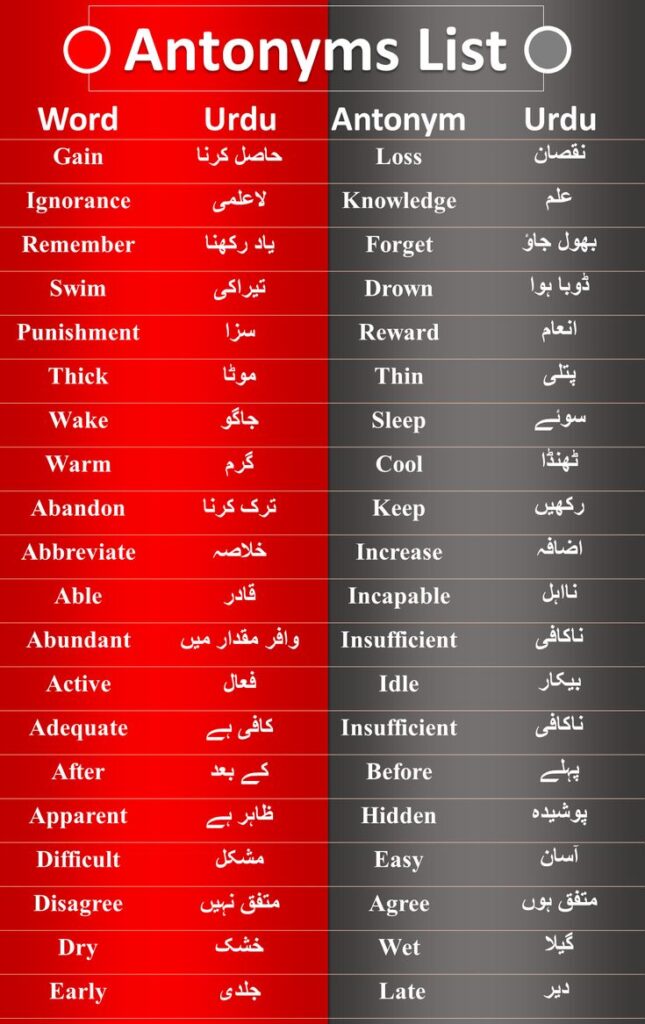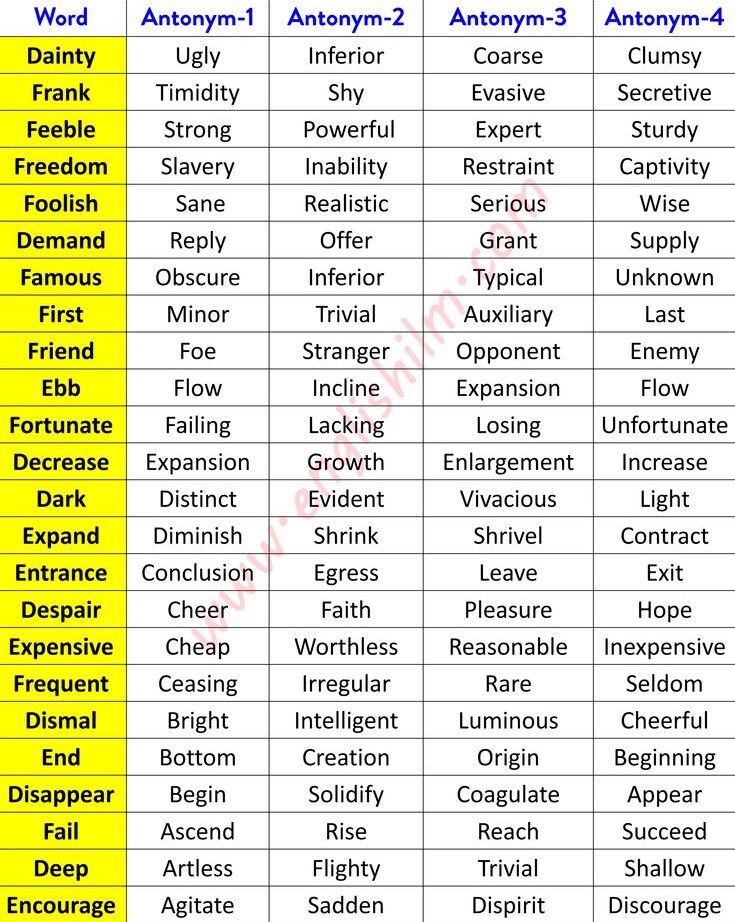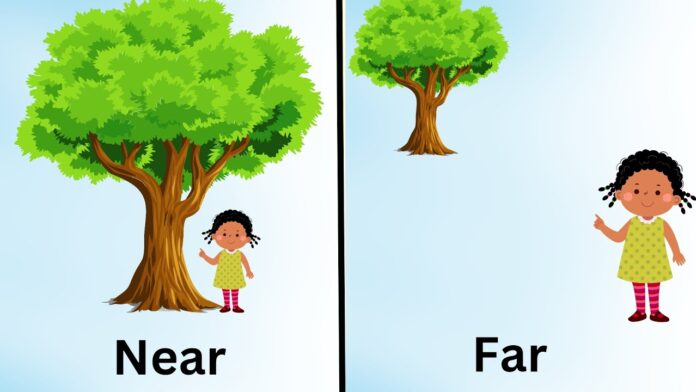Antonyms are words with opposite meanings. Enhancing your vocabulary with antonyms can improve your communication skills.
Learning antonyms is essential for expanding your English vocabulary. Opposite words help you express ideas more precisely and vividly. By understanding antonyms, you can better articulate your thoughts and avoid repetition. This skill is crucial for writing, speaking, and comprehension.
Mastering antonyms enhances your ability to convey emotions and nuances. It also aids in better understanding context and improving reading skills. A robust vocabulary helps you stand out in both personal and professional communication. This list of 500+ antonyms will significantly boost your language proficiency. Dive into the list to enhance your vocabulary and sharpen your linguistic abilities.
Introduction To Antonyms
Antonyms are words that have opposite meanings. Understanding antonyms can help you improve your English vocabulary. By learning antonyms, you can express yourself more clearly. You can also better understand what others are saying or writing.
Why Antonyms Matter
Antonyms are important because they help you understand different meanings. Knowing the opposite of a word can make your speech or writing more interesting. It allows you to compare and contrast ideas effectively.
For example, the antonym of “happy” is “sad.” If you know both words, you can describe feelings more accurately. This makes your language richer and more precise.
The Impact On Language Proficiency
Learning antonyms can significantly boost your language skills. It helps you understand the context of conversations better. When you know antonyms, you can quickly grasp the meaning of sentences.
Antonyms also aid in reading comprehension. They help you understand the tone and mood of a text. This can be particularly useful in exams and everyday reading.
Here is a simple table of some common antonyms:
| Word | Antonym |
|---|---|
| Hot | Cold |
| Big | Small |
| Fast | Slow |
By learning and practicing these antonyms, you can enhance your English vocabulary. This will make you a more confident and effective communicator.
Antonyms In Everyday Language
Antonyms are words with opposite meanings. They play a crucial role in our daily conversations. Understanding antonyms can enhance your English vocabulary. They help to express thoughts more clearly and effectively.
Common Examples
Here are some common antonyms you might use every day:
- Hot vs. Cold
- Happy vs. Sad
- Big vs. Small
- Fast vs. Slow
- Light vs. Dark
Antonyms You Might Not Know
Some antonyms are less common but equally useful. Here’s a list:
| Word | Antonym |
|---|---|
| Abundant | Scarce |
| Genuine | Fake |
| Complex | Simple |
| Rigid | Flexible |
| Visible | Invisible |
Using these antonyms can make your language more precise. They allow you to convey exact meanings and avoid confusion.
Categorizing Antonyms
Antonyms are words with opposite meanings. Understanding antonyms can boost your English vocabulary. They can be grouped into different categories. This helps to understand their nuances better.
Simple Vs. Complex
Simple antonyms are easy to understand. They are usually basic words. For example:
- Hot – Cold
- Big – Small
- Fast – Slow
Complex antonyms are more advanced. They involve deeper understanding. For example:
- Optimistic – Pessimistic
- Flamboyant – Reserved
- Meticulous – Careless
Graded Antonyms And Complementary Pairs
Graded antonyms show a spectrum of meaning. There is no absolute opposition. Examples include:
- Hot – Warm – Cool – Cold
- Happy – Content – Unhappy – Sad
- Bright – Dim – Dark
Complementary pairs are absolute. One exists because the other does. For example:
- Alive – Dead
- True – False
- On – Off
| Simple Antonym | Complex Antonym | Graded Antonym | Complementary Pair |
|---|---|---|---|
| Hot – Cold | Optimistic – Pessimistic | Hot – Warm – Cool – Cold | Alive – Dead |
| Big – Small | Flamboyant – Reserved | Happy – Content – Unhappy – Sad | True – False |
| Fast – Slow | Meticulous – Careless | Bright – Dim – Dark | On – Off |
The Role Of Context
Context plays a crucial role in understanding antonyms. The meaning of a word can change based on the situation. Without context, antonyms may be confusing or misleading. Context helps us understand the exact meaning of a word in a sentence.
How Context Influences Meaning
Words have different meanings depending on the context. A word might have one antonym in one situation and a different antonym in another. Understanding the context helps us choose the right antonym.
| Word | Context | Antonym |
|---|---|---|
| Light | Brightness | Dark |
| Light | Weight | Heavy |
| Cool | Temperature | Hot |
| Cool | Attitude | Angry |
Antonyms With Multiple Meanings
Some words have multiple antonyms. These antonyms depend on the context. For example, the word “fast” can mean “quick” or “secured”. Its antonyms could be “slow” or “loose”. Understanding the context helps us know which antonym to use.
- Fast (Quick) – Slow
- Fast (Secured) – Loose
- Bright (Intelligent) – Dumb
- Bright (Light) – Dim
Antonyms In English Literature
Antonyms are words with opposite meanings. They play a vital role in English literature. Writers often use antonyms to create contrast and highlight differences. This technique adds depth and drama to their work.
Using Antonyms For Dramatic Effect
Authors use antonyms to create tension and emphasize themes. A character may face choices between good and evil, love and hate, hope and despair. These opposing forces make the story more engaging.
Consider the phrase: “It was the best of times, it was the worst of times.” This famous line from Charles Dickens uses antonyms to show extreme conditions. The contrast draws readers in and sets the tone for the story.
Classic Literature Examples
Antonyms appear in many classic works. Here are some examples:
- “Pride and Prejudice” by Jane Austen: Characters struggle between pride and humility.
- “A Tale of Two Cities” by Charles Dickens: Themes of life and death, light and darkness.
- “Romeo and Juliet” by William Shakespeare: The love of Romeo and Juliet contrasts with the hate between their families.
These examples show how antonyms enrich the narrative. They help readers understand the conflict and resolution in the story.
| Antonym Pair | Example in Literature |
|---|---|
| Good – Evil | “Dr. Jekyll and Mr. Hyde” by Robert Louis Stevenson |
| Hope – Despair | “Great Expectations” by Charles Dickens |
| Love – Hate | “Wuthering Heights” by Emily Brontë |
Understanding these antonyms can enhance your appreciation of literature. It can also help you build a richer vocabulary.

Learning Strategies For Antonyms
Learning antonyms can significantly enhance your English vocabulary. Understanding opposite words helps you communicate more effectively. Below are some effective learning strategies for mastering antonyms.
Memory Aids
Using memory aids can make learning antonyms fun and easy. Mnemonic devices are great tools. For example, to remember the antonyms of “hot” and “cold”, you can think of a hot cup of tea turning into iced tea. Visual aids like flashcards can also help. Write the word on one side and its antonym on the other.
Grouping antonyms into categories can help too. For instance:
| Category | Word | Antonym |
|---|---|---|
| Size | Big | Small |
| Emotion | Happy | Sad |
| Time | Early | Late |
Practice Through Writing
Writing can reinforce your memory and understanding of antonyms. Start by writing sentences using pairs of antonyms. For example, “The ice is cold, but the sun is hot.” This helps you see the words in context.
Journaling is another great method. Write daily entries and challenge yourself to include at least five antonyms. This practice will make you more comfortable using these words.
Creative writing exercises can also be beneficial. Write short stories or poems that include antonyms. This not only improves your vocabulary but also makes learning enjoyable.
Here is a quick exercise:
- Write a sentence with the word “happy”.
- Now, rewrite the sentence using its antonym “sad”.
Incorporating these strategies into your learning routine can help you master antonyms effectively. Happy learning!
Antonyms In Language Tests
Antonyms are a key part of language tests. They help assess your understanding of vocabulary. Knowing opposite words can boost your scores in exams like TOEFL, IELTS, SAT, and GRE. Here’s how antonyms play a role in these tests.
Preparing For Toefl And Ielts
TOEFL and IELTS are major English tests. They measure your ability to use English in academic settings. Antonyms are often used in the reading and vocabulary sections.
To prepare, make a list of common antonyms. Practice using them in sentences. This helps you understand their meanings better. For example:
- Happy – Sad
- Brave – Cowardly
- Fast – Slow
Understanding antonyms helps you answer questions correctly. It improves your ability to comprehend reading passages. These skills are crucial for high scores in TOEFL and IELTS.
Antonyms In Sat And Gre
SAT and GRE tests also use antonyms. These exams focus on your verbal reasoning skills. Knowing opposite words can help you in the verbal sections.
For the SAT, practice identifying antonyms in context. This will help you understand the meaning of complex sentences. For example:
- Optimistic – Pessimistic
- Generous – Stingy
- Flexible – Rigid
In the GRE, antonyms are often part of the vocabulary questions. Knowing a wide range of antonyms can boost your verbal score. Here’s a quick list:
| Word | Antonym |
|---|---|
| Abundant | Scarce |
| Complex | Simple |
| Fragile | Strong |
Regular practice is key. Use flashcards, quizzes, and practice tests. This will help you master antonyms and improve your performance.
Fun With Antonyms
Antonyms, or opposite words, can make your English vocabulary more vibrant and expressive. Learning antonyms can be fun and engaging. Let’s explore some entertaining ways to master antonyms.
Games And Quizzes
Games and quizzes are excellent tools to learn antonyms. They make the learning process enjoyable and interactive. Here are some ideas:
- Flashcard Game: Create flashcards with words on one side and their antonyms on the other. Shuffle and test yourself.
- Memory Match: Make pairs of cards with words and their antonyms. Mix them up and match them correctly.
- Online Quizzes: Take online quizzes that focus on antonyms. Websites like Quizlet offer plenty of options.
Antonyms In Puzzles
Puzzles can also be a fun way to learn antonyms. They help improve cognitive skills while expanding your vocabulary. Here are a few puzzle ideas:
- Crossword Puzzles: Create or solve crossword puzzles that use antonyms as clues and answers.
- Word Search: Find pairs of antonyms hidden in a grid of letters. Use different colors to highlight each pair.
- Jigsaw Puzzles: Write a word on one piece and its antonym on another. Fit them together to complete the puzzle.
Below is a table of some common antonyms to get you started:
| Word | Antonym |
|---|---|
| Hot | Cold |
| Happy | Sad |
| Big | Small |
| Fast | Slow |
| Light | Dark |
These activities and resources will make learning antonyms a delightful experience. Enjoy expanding your English vocabulary with these fun methods!
Beyond The Basics
Learning antonyms can greatly enhance your English vocabulary. For beginners, simple antonyms like “big” and “small” are good. But for proficient speakers, it’s crucial to go beyond the basics. This section dives into advanced antonyms, synonyms, and homonyms to enrich your language skills.
Advanced Antonyms For Proficient Speakers
Advanced antonyms can make your speech and writing more compelling. Here are some pairs:
| Word | Antonym |
|---|---|
| Abundant | Scarce |
| Complex | Simple |
| Meticulous | Careless |
| Elaborate | Plain |
| Optimistic | Pessimistic |
Exploring Synonyms And Homonyms
Understanding synonyms and homonyms can add depth to your vocabulary. Synonyms are words with similar meanings, while homonyms sound the same but have different meanings.
- Synonyms:
- Happy – Joyful
- Sad – Unhappy
- Fast – Quick
- Smart – Intelligent
- Cold – Chilly
- Homonyms:
- Bark (tree) – Bark (dog)
- Bat (animal) – Bat (sports)
- Lead (metal) – Lead (guide)
- Fair (just) – Fair (event)
- Left (direction) – Left (past tense of leave)


Resources For Expanding Your Vocabulary
Enhancing your vocabulary with antonyms can be both fun and educational. To help you achieve this goal, we’ve compiled a list of valuable resources. These resources include books, websites, apps, and online tools. Each resource is designed to make learning opposite words easy and enjoyable.
Books And Websites
Books and websites are excellent tools for expanding your vocabulary. They provide structured content and reliable information.
| Books | Websites |
|---|---|
| Word Power Made Easy by Norman Lewis | Vocabulary.com |
| English Vocabulary in Use by Michael McCarthy | Dictionary.com |
| Oxford Advanced Learner’s Dictionary | Thesaurus.com |
Apps And Online Tools
Apps and online tools offer interactive ways to learn new words. They often include games, quizzes, and other engaging activities.
- Duolingo: Offers vocabulary building exercises and quizzes.
- Quizlet: Provides flashcards and learning games for antonyms.
- Merriam-Webster: Features word of the day and vocabulary quizzes.
- Memrise: Uses spaced repetition to help you remember new words.
These resources can significantly enhance your English vocabulary. Use them regularly to see noticeable improvements in your language skills.
Antonyms In Professional Settings
Enhancing your vocabulary with antonyms can significantly improve your professional communication. Whether you’re in a business or academic environment, using precise language is crucial. Below, we explore the importance of antonyms in professional settings.
Business Communication
In the business world, clarity and precision are essential. Using the right antonyms can help you achieve this. Here are some examples:
| Word | Antonym |
|---|---|
| Agree | Disagree |
| Success | Failure |
| Profit | Loss |
| Advantage | Disadvantage |
| Increase | Decrease |
Using these antonyms appropriately can make your business communication more effective. This ensures that your message is clear and easily understood.
Academic Writing
In academic writing, accuracy is paramount. Antonyms can help you express contrasting ideas clearly. Here are some examples:
| Word | Antonym |
|---|---|
| Abstract | Concrete |
| Complex | Simple |
| Consistent | Inconsistent |
| Include | Exclude |
| Support | Oppose |
Using the right antonyms in academic writing helps you present balanced arguments. It also enhances the clarity of your work, making your points more compelling.
Cross-linguistic Perspective On Antonyms
Antonyms are words with opposite meanings. Understanding antonyms can enhance your English vocabulary. But how do antonyms work in different languages? Let’s explore the fascinating world of antonyms from a cross-linguistic perspective.
Antonyms In Different Languages
Different languages have unique ways of forming antonyms. In English, we often use prefixes like “un-“, “in-“, or “dis-“ to create antonyms. For example:
| Word | Antonym |
|---|---|
| Happy | Unhappy |
| Visible | Invisible |
| Agree | Disagree |
In Spanish, antonyms are often formed using prefixes like “des-“ or “in-“. For instance:
- Deshacer (to undo) is the antonym of hacer (to do).
- Infeliz (unhappy) is the antonym of feliz (happy).
In Japanese, antonyms can be more complex. They might involve entirely different words rather than just prefixes.
Cultural Nuances
Antonyms can reflect cultural values. In some cultures, certain concepts might not have direct antonyms. For instance, in some Asian cultures, the concept of “losing face” does not have a direct opposite. This indicates the cultural importance placed on maintaining dignity.
In English-speaking cultures, there are clear antonyms for many concepts. This reflects a more binary way of thinking. Words like “success” and “failure” show this binary perspective. In other cultures, the nuances might be more complex.
Understanding antonyms across languages can give you a deeper insight into cultural perspectives. It also enriches your vocabulary and helps you communicate more effectively.
Frequently Asked Questions
What Is The Antonyms Of Opposite Word In English?
The antonym of “opposite” in English is “same” or “similar. ” These words indicate likeness or similarity.
What Is The 20 Opposite Words?
Here are 20 opposite words: hot-cold, big-small, happy-sad, fast-slow, light-dark, up-down, in-out, full-empty, open-closed, hard-soft, old-new, rich-poor, strong-weak, early-late, young-old, heavy-light, tall-short, clean-dirty, noisy-quiet, and wet-dry.
Conclusion
Expanding your vocabulary with antonyms can greatly enhance your English skills. This list of 500+ opposite words is a valuable resource. Use it to improve communication and writing. Keep practicing and incorporating new words into your daily conversations. A richer vocabulary will open up new opportunities and boost your confidence.






